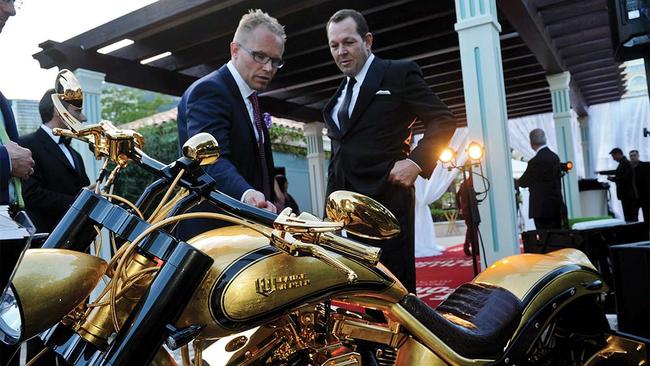
What’s $300m between friends? That kinda depends on who is asking, and why.
That was the thorny question confronted by Sleeping Duck founder Selvam Sinnappan last week, amid an ongoing legal dispute over whether he and business partner Winston Wijeyeratne did or did not diddle angel investor Adir Shiffman out of a 20 per cent share of the online mattress company.
Shiffman is suing both men, alleging he was frozen out of the company as sales took off, claiming he was promised a 20 per cent stake in Sleeping Duck in exchange for his business expertise and know-how.
The Victorian Supreme Court will ultimately decide the merits of the various arguments but, in the meantime, Dr Shiffman’s lawyers have been running a busy side business in teasing out what that stake might actually be worth if their case is successful, according to transcripts of the action obtained by Margin Call.
On Wednesday Sinnappan told the court the entire business was worth about $45m – or a smidgen under $25m excluding the $21m in cash it is holding in the bank. That is roughly in line with the valuation put on the business by an expert report, prepared ahead of this year’s annual financial results.
That’s roughly a three times multiple of Sleeping Duck’s expected earnings for the current year, according to information extracted by Shiffman’s lawyer in court, Michael Borsky, KC.
It’s also a radical departure from Sinnappan’s valuation view in June 2019, when he penned an email to Shiffman arguing a $25m valuation – based on revenue of $9.4m and annual earnings of $1.1m – was too low.
That valuation, for the record, is a touch under three times revenue, or 20 times earnings.
In 2020 Sinnappan and his partner also knocked back an offer from Adairs valuing their stake at 10 times earnings, according to court filings.
Last week Sinnappan agreed that $8m was a fair assessment of the projected earnings of Sleeping Duck for the current financial year (down from around $13m from the 2022 fiscal year, according to ASIC records, when revenue hit $74.6m).
But it may come as no surprise that Sinnappan’s view of earnings multiples has also changed in recent times, as witnessed by his $25m valuation these days – just over three times projected earnings for FY24, as it happens.
Imagine then, the glee in chambers on Friday, when the AFR’s Young Rich List came out on Friday – valuing Sinnappan and Wijeyeratne at $170m each, implying a combined $340m valuation of their 85 per cent stake in Sleeping Duck.
Who knows what the pair may have told the AFR, but that is a 30 times multiple of the 2022 earnings – well beyond what Sinnappan was prepared to cough up to in court.
Mining mayhem
The case of failed Philippines gold miner X64 is moving from the merely colourful and straight into the downright weird.
PwC administrators Simon Theobald and Martin Ford were called into the company in early July, appointed by a fresh set of directors who had only taken control of the company a fortnight before – after their predecessors, led by NRW Holdings founder Jeffrey McGlinn, resigned on the eve of a bitterly contested spill motion.
Ahead of the collapse X64 had somehow lost control of its gold mine, and went under despite the group of companies it controlled – including Philippines subsidiaries – holding cash worth about $58.3m at the end of June.
While there was no doubt X64’s directors inherited a mess, their decision to put the company under was always a bit of a head-scratcher.

The answer is contained in PwC’s administrator report, released ahead of a creditor’s meeting on Tuesday aimed at approving the company’s sale to its Hong Kong-based subsidiary, Komo Diti Traders.
The answer, in short, is that X64 was not actually insolvent when PwC was appointed – but the dispute over the true ownership of a majority 60 per cent stake in its gold mine threatened to starve its Australian parent of cash in the future.
More urgently, however, was the fact that the incoming board found it impossible to get directors’ and officers’ insurance – which cover the personal liability for decisions directors and management take when running a company.
The reason, according to PwC? The previous board had put X64’s policy into run-off – effectively extending coverage for the outgoing board at the expense of incoming directors, while also leaving a big bill for the company.
Run-off premiums are usually used by people winding up a business where claims might arise in the future, particularly when the company has no ongoing earnings.
In this context, it also made it very difficult to take out a new policy – effectively ensuring the new board had to walk away as soon as they could.
“It also meant that the company did not receive value for the unexpired portion of the existing policy,” says PwC.
While PwC kept its powder dry on the details of most of its investigations into whether X64’s outgoing directors breached any of their duties and/or relevant laws, Theobald and Ford’s report makes it clear that there’s plenty more to come for aficionados of mining sector shenanigans.
On top of the insurance policy decision, PwC flagged an application to the courts for potential public examinations into the failure of the company and further investigation of the loss of control of the gold mine, “unreasonable expenditure” made by the company – along with a host of potential market disclosure issues.
While the report is rich in foreshadowing, only McGlinn – who breeds Arabian horses and has thrown parties attended by Saudi royalty – is singled out, for $440,417 in “termination pay” made to his management company on his departure from X64.
“Payment of the above amounts may constitute unreasonable director-related transactions where Mr McGlinn resigned as a director rather than being terminated. However, further investigation is required,” the report says.



